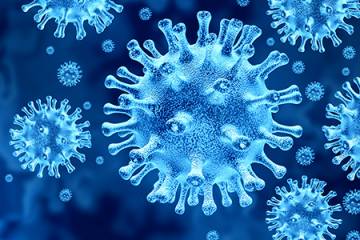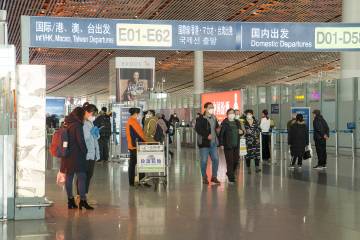Since the first reports of the novel coronavirus outbreak in China surfaced two months ago, Johns Hopkins officials have been working to ensure the Hopkins community is well prepared for any potential direct impacts. With the number of infections growing worldwide in recent weeks and the U.S. Centers for Disease Control and Prevention warning last week of the likelihood that the virus will spread in the U.S., their efforts have intensified.
Multidisciplinary working groups at JHU are coordinating to identify and plan for an array of possible challenges, including disruptions to classes, transportation, housing, work, and travel. Teams are also working to ensure the availability of necessary supplies, including medical equipment and food.
"There are people who are working very hard on this, and we've been doing it for weeks now," says Lisa Maragakis, a Johns Hopkins epidemiologist involved in the response. "The threat is out there, but it's not here at our doorstep, so a lot of our activity now is planning and thinking through all the different implications if infections start to be transmitted in our area."
As of Monday, approximately 90,000 cases of the virus, known as COVID-19, have been reported in more than 70 countries, and the number of associated deaths has surpassed 3,000. Eighty-nine cases have been confirmed in the United States, with six deaths reported in Washington state. Last week, CDC officials struck a cautionary tone, warning that the virus will almost certainly continue its spread into U.S. communities and encouraging hospitals, businesses, and schools to make preparations.
In a message to the Johns Hopkins community Friday, university leaders noted that although no COVID-19 cases have been reported at the university or in Maryland, the university is actively planning and preparing for potential impacts and working to address the questions and concerns of the university's faculty, staff, students, and others.
"We are confident in the resources we have put in place to help us navigate through this challenging global event, and we remain committed to your health and well-being as well as to operational continuity to the greatest extent possible," wrote Kevin Shollenberger, vice provost for student health and well-being, and Jon Links, vice provost and chief risk and compliance officer.
Links said Monday that two parallel planning tracks are in place:
- Acute response, which are efforts focused on issues such as screening, quarantine and isolation, and provision of health care
- Business continuity efforts, which focus on academic and research programs, including international students who might not be able to enter the U.S., as well as monitoring the potential for the spread of COVID-19 on JHU campuses
University officials are developing alternatives to on-site classes should the situation warrant. For employees, including academic departments and administrative offices, Maragakis said leaders should consider developing contingency plans—such as telework arrangements if employees need to remain at home, based on existing Human Resources policies. "Each case will be different," she said.
The Johns Hopkins Office of Critical Event Preparedness and Response, or CEPAR, is coordinating the overall response across the university and health system. CEPAR publishes up-to-date travel guidance on its website. Considerations include spring break plans as well as immigration-related concerns and study abroad complications. University officials made alternate arrangements for students who were scheduled to study abroad this semester in China, where COVID-19 originated, and have now recalled study abroad students from Italy. They're also closely monitoring the situation at the Johns Hopkins SAIS campus in Bologna, Italy. At this time, the campus remains operational, with students having the option to participate in classes online from anywhere in the world.
"I want to reassure people that a lot of work has been done and is being done to keep our community—our employees and our students—safe," said Maragakis, a senior adviser for CEPAR. "More needs to be done, and there are always unknowns, but that's the basic message."
Posted in Health, University News
Tagged infectious disease, cepar, pandemics, coronavirus










